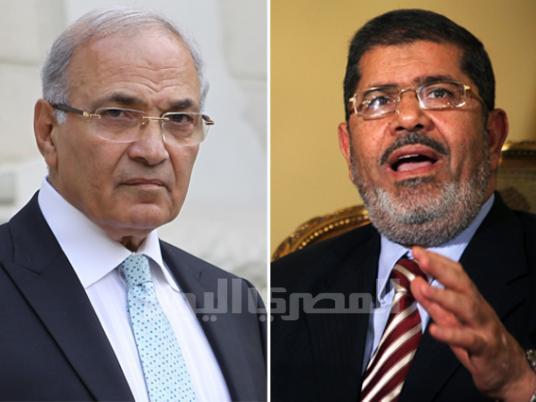
In Egypt’s unpredictable presidential poll, the two most controversial contenders emerged triumphant to qualify for next month’s run-off amid fears that either candidate's victory may deal a blow to the 25 January revolution.
On 16 and 17 June the Muslim Brotherhood’s last-minute presidential nominee, Mohamed Morsy, is set to compete with Ahmed Shafiq, Hosni Mubarak’s last prime minister, over the highest executive post. Morsy and Shafiq received respectively 24.9 and 24.5 percent of the votes in the first round.
The two outran the three other viable contenders: Nasserist Hamdeen Sabbahi (21.1 percent), moderate Islamist Abdel Moneim Abouel Fotouh (17.8 percent), and former Arab League Secretary General Amr Moussa (11.3 percent).
In the lead-up to the poll, both Shafiq and Morsy served as subjects of a plethora of political jokes that underestimated their chances. For several weeks, Morsy was dismissed as “the spare tyre” because the Brotherhood fielded him when its influential leader Khairat al-Shater was disqualified due to his unresolved criminal record.
As for Shafiq, he was constantly mocked by political activists for his flagrantly inconsistent statements and uncharismatic appearance. Besides, the legitimacy of his candidacy remained contested until only a few days before the poll kicked off. After the Brotherhood-dominated parliament passed a law barring Mubarak’s former aides and prime ministers from running for public office, Shafiq was considered disqualified. However, the judicial Presidential Election Commission declined to enforce the law, doubting its constitutionality.
“This is the worst scenario,” said Mostafa Kamel al-Sayed, a political science professor at Cairo University. “The two of them definitively stand against the principles of the 25 January revolution.”
"The revolution happened to establish a civil state. The two candidates who won are the furthest from that civil state,” added Sayed.
“Shafiq comes from the military and a civil state cannot be run by a military man. And the Muslim Brotherhood, they are still opposed to considering Egypt a civil state in the sense of a state not ruled by religion,” he said.
Both candidates have complex relationships with revolutionary forces. For several months, the Brotherhood has antagonized young revolutionary groups by accusing them of instilling chaos and seeking to destroy the state. In the meantime, the Brotherhood turned secular forces against it by trying to tighten the Islamist grip over the Constituent Assembly tasked with writing the constitution.
Shafiq is a notorious figure for Islamist and non-Islamist forces alike given his strong ties with Mubarak’s regime and suspicions that he might be the Supreme Council of the Armed Forces’candidate.
In the midst of the 18-day uprising that culminated in his ouster, Mubarak appointed Shafiq as prime minister. The notorious Battle of the Camel, in which assailants invaded Tahrir Square on horseback and camels to attack protesters, took place under his tenure.
After Mubarak stepped down, Shafiq, a former leader of Egypt's air force, held on to the premiership for a short period until revolutionaries mobilized sweeping protests to force the generals to dismiss him. Since then, he has made several provocative statements praising Mubarak and expressing sorrow over the revolution. Most observers took his candidacy lightly and contended that voters would not back such a “counter-revolutionary” figure. But the ballot box has proven otherwise.
According to Ashraf al-Sherif, a political scientist at the American University in Cairo, all the tenets of the ancien régime have converged to ensure Shafiq’s victory.
"All our talk about the fall of the old regime's networks was proven hasty and imprecise,” said Sherif.
“The networks of businessmen, security apparatus, traditional loyalties in the countryside and urban areas are still there and support Shafiq. Plus, there is a large segment of people who supported him in pursuit of stability and security and out of fear of Islamists,” he added.
Shafiq has been marketing himself as the strong statesman who can achieve stability and fix post-revolution security laxity, two major concerns for many voters.
This discourse allowed him to garner the backing of nearly a quarter of eligible Egyptian voters in both rural and urban centers, and to defeat revolutionary candidates Abouel Fotouh and Sabbahi.
Divisive run-off
For Sherif, both Shafiq and Morsy stand similar chances in the run-off. While Morsy is expected to unify the Islamist votes that were divided between him and Abouel Fotouh in the first round, Shafiq is set to attract the votes of “the old regime's networks, Copts, possibly Moussa's backers, some of Sabbahi's supporters and those who fear Islamists,”Sherif said.
Morsy’s and Shafiq’s close scores indicate that the next round won’t necessarily be an easy endeavor for the Brotherhood. This reading might be why the group is seeking to convince various political factions and losing candidates to announce their endorsement of Morsy in the run-off. The group hopes it can attract almost 50 percent of the votes that went to Abouel Fotouh, Sabbahi and Moussa.
“The political forces have an urgent mission now to rescue the country and this requires the victory of a candidate who belongs to the revolutionary bloc,” Essam al-Erian, the vice president of the Brotherhood’s Freedom and Justice Party, told reporters in a press conference on Friday in reference to Morsy.
The FJP has called for a meeting on Saturday afternoon with various political forces hoping to gain their support in the run-off.
When asked what could the FJP offer other parties in return, Erian responded: “No party has made any gains that it can concede to others. We are all partners in bearing responsibility. Building the country needs everyone’s efforts.”
A murky future
Although he invested heavily in pledging stability, Shafiq’s rise to the presidency is expected to instigate more political turmoil.
“There will be more instability under Shafiq because he starts with bad relations with the Muslim Brotherhood and revolutionary groups,” said Sayed. “Shafiq will find it very difficult to deal with political forces and a parliament dominated by the Muslim Brotherhood.”
Shafiq’s animosity to revolutionary forces is quite obvious. Asked earlier this month what his response would be if thousands take to Tahrir Square to protest his ascent to the presidency, he said the military could evacuate the square in five minutes. The statement alarmed many observers, who saw it as an indicator that Shafiq will use the army to crush his political opponents.
Shafiq’s anti-Islamist attitudes must be equally alarming to the Brothers and Salafis, who together hold almost two-thirds of the Parliament. His campaign spokesperson reportedly said many voters backed his candidacy to “save Egypt from dark forces” — in reference to Islamists. Yet in his first comments on the first round’s results, Shafiq said that he will have no objection to a Brotherhood member holding the premiership if he wins the presidency.
“Shafiq will try to reproduce the old regime with the same ugly tools…The security apparatus will interfere again with elections and social activities,” said Sherif.
Such attitudes will provoke more protests, predicted Sherif.
How the Brotherhood would react to Shafiq’s victory remains unknown. In yesterday’s press conference, Erian declined to discuss this scenario, dismissing it as “an impossible hypothesis.” Other FJP party leaders also insist that Egyptian voters will not choose Shafiq over Morsy in the run-off.
“We trust that the majority of the Egyptian people will not reproduce the old regime,” Osama Yassin, an FJP leader, told reporters on the sidelines of the conference.
Sherif ruled out the Brotherhood taking to the streets to challenge Shafiq’s presidency, arguing that they are not confrontational enough.
Most experts on the group hold that the Brotherhood would not throw themselves into any head-on confrontation with the political establishment for fear of provoking a military coup that would eradicate all the political gains they have made since Mubarak’s ouster. Many say that the Brotherhood will end up accepting a tacit power-sharing agreement with the generals. Condoning Shafiq’s presidency might be part of this arrangement.
According to Sayed, Morsy’s victory would not cause as much instability as Shafiq’s. Yet, eventually, that group will alienate other political forces, he added,
“In the beginning, political forces will give him the benefit of the doubt, but sooner or later the way the FJP acted before the elections will be repeated. The FJP will not allow other political forces to contribute significantly to the decision-making process,” argued Sayed.
"The Muslim Brotherhood are interested in controlling all state institutions," he said.

